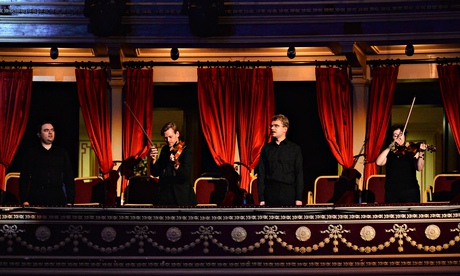
The most eagerly anticipated of the premieres in this year's Proms was also the most mysterious. Benedict Mason's Meld, a BBC commission, was originally promised for the 2012 season but was not ready in time, and information on this rescheduled performance by the choir Chantage and a hugely expanded Aurora Orchestra was so approximate that one worried whether it would materialise this time either. But appear it duly did at this late-night concert. Mason had apparently discouraged the release of any details in advance, so that the audience would approach the event without preconceptions – and the result was every bit as strange and often as beautiful as one could hope.
Much of Mason's music since the mid-1990s has been site-specific – he created a whole series of pieces called Music for Concert Halls, composed to exploit the acoustics of particular auditoriums – and Meld was conceived for the particular geometry of the Royal Albert Hall. This was one of those rare Proms occasions when listeners to Radio 3 would have heard far less of the total musical picture than we did in the hall, for every level of the auditorium and the corridors outside were used during the 45-minute work, as the singers and instrumentalists migrated from level to level in carefully choreographed fashion. The choir and orchestra moved round the gallery under the hall's dome while musical calls and signals echoed around them. They eventually reached the stage and the arena (kept clear of promenaders for this performance), before the sounds finally faded into the distance again.
There were many arresting ideas en route: two- and three-note signals exchanged across the whole space; ripples of pizzicato orbiting the hall like musical Mexican waves; mysterious pedal notes sounding from outside the hall altogether; cellos populating the grand tier boxes; four tubas in the centre of the arena encountering four steel drums coming down the aisles to meet them; fierce clusters from the RAH organ cutting across everything else. Sometimes it seemed like a mysterious ritual, elsewhere like an installation or a "happening". Some of Cage's later works, like Europeras or Roaratorio, kept coming to mind, especially when the orchestra and the choir seemed to be gathering in the arena for an out-of-kilter ceilidh.
Perhaps Meld is just a bit too long, and the structure just a little too loosely structured, to sustain such a span. But so many of the ideas are compelling that it hardly matters. The performance, with everyone playing and singing from memory, and co-ordinated by electronic click tracks piped into their ears, was fabulously committed (the Aurora Orchestra and its director Nicolas Collon had begun the concert with a wonderfully unbuttoned performance of Mozart's G minor Symphony K550, also played from memory).
It's hard to think of another composer, certainly not a British one, who would have come up with something as teasingly original for the Proms as Mason's score, and made it work so convincingly.
• The Proms continue until 13 September. Details: Proms 2014.

